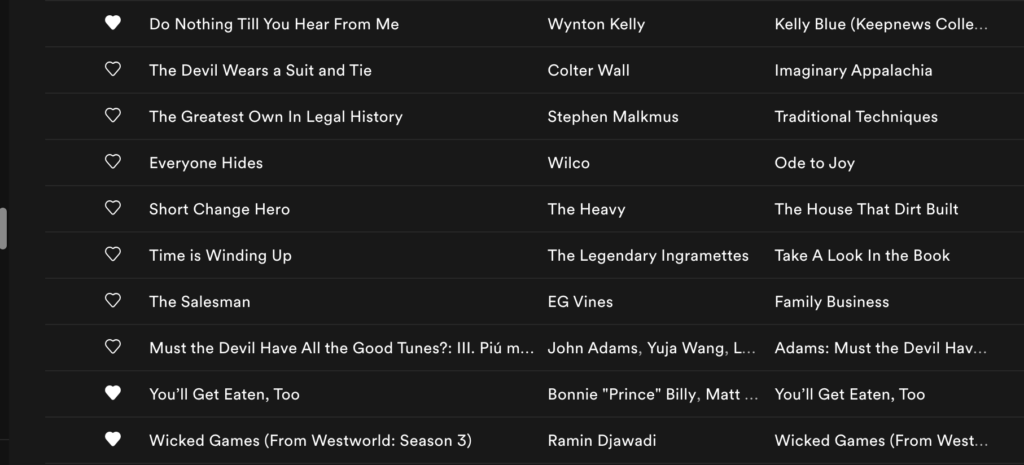SIGTARP’s Child, White Collar Music, Americano Cocktail
Reading Time: 4 minutes.
Government is all but frozen except for COVID-19 matters, but investigation and enforcement will begin again. In this post, we make a few notes about what to expect. Plus, new additions to the White-Collar Wire playlist on Spotify. And, the Americano.
Law

A couple of trillion dollars sloshing through the economy will raise a multitude of compliance and enforcement concerns. Here is a piece (“SIGTARP’s Child: Coronavirus, CARES, and Compliance”) that I wrote with my Lightfoot partners Brandon Essig and Jeff Doss, recently published in the Birmingham Business Journal:
In a public health situation with little historical precedent, Congress passed and the President signed into law the stimulus and relief package known as the Coronavirus Aid, Relief, and Economic Security Act (the “CARES Act”). With a price tag of about $2 trillion, many of the implications of this extraordinary legislation will not be known for years to come. One implication, however, seems certain: in the months and years ahead, we will see regulatory, civil, and criminal enforcement relating to the CARES Act on a scale unseen since shortly after the recession of 2007-2009.
Why is this so?
The recession gives us a partial answer. The recession involved, among other things, passage of the American Recovery and Reinvestment Act and creation of the companion Troubled Asset Relief Program (“TARP”). The latter effort involved loans (or bailouts) to companies, banks, and financial institutions – including those, famously, “too big to fail.” One component of the TARP effort was the establishment of the Special Inspector General for the Troubled Asset Relief Program (“SIGTARP”). In a similar vein, the CARES Act creates a new Special Inspector General for Pandemic Recovery (“SIGPR”) situated in the Department of the Treasury and given the job of investigating and auditing how the Department and other entities administer the program.
Although “SIGPR” does not roll off the tongue as easily as “SIGTARP,” the former – like the latter — has broad information-gathering powers; may issue subpoenas to individuals and businesses for sworn testimony; and, remarkably, can make warrantless arrests and seek arrest and search warrants without first obtaining authorization from the Attorney General. SIGPR also has referral-authority for criminal matters. SIGTARP recovered billions of dollars and prompted or participated in civil and criminal enforcement actions against bank and non-bank executives, managers, and employees. We should expect no less from SIGPR.
What can recipients of CARES dollars do today to prepare for months — if not years — of audits, investigations, and enforcement activities by SIGPR and its fellow agencies?

Fastidious Accounting. In the middle of a public health crisis, chatter about accounting seems misplaced. Yet, down the road, it will be critical for those who receive federal money under the CARES Act to be able to prove not only that their books and records are maintained appropriately in the ordinary course but also that all of the money received in this emergency situation was spent for its intended purposes.
Certify With Care. The CARES Act, like most federal statutes disbursing money, requires certifications by recipients. If such statements (about eligibility, for example) are false and “material,” and submitted either intentionally or recklessly, they could easily become the basis for a civil or criminal claim under the federal False Claims Act. In addition to FCA exposure, false statements and false certifications can lead to an array of federal criminal charges, especially when those false statements are made to financial institutions.
Review Remote Compliance. The coronavirus pandemic will cease, but the dramatic shift to remote working will mark a sea-change for how financial institutions and other organizations will need to implement compliance and then oversee it. On the one hand, necessary efforts to track and suppress the progress of COVID-19 have caused governments around the world to practice, even in liberal democracies, a level of mass social control and information-gathering rarely seen in peacetime. To the extent the American workforce is conditioned to such invasions and guard rails, gathering data on compliance and taking swift remedial measures may actually become easier for compliance officers and corporate policy makers. On the other hand, a remote worker is just that – remote – despite the many technological bells and whistles available, and the opportunities for mischief with CARES Act funds may well be enhanced.
Music
There are many updates to the White Collar Wire playlist (“Music for white-collar crime”) on Spotify:
Here are the latest entries:

Finally, please listen to and follow Episode 2 of the “White Collar Wire” podcast also on Spotify:
Extra: an Americano with David Lebovitz: